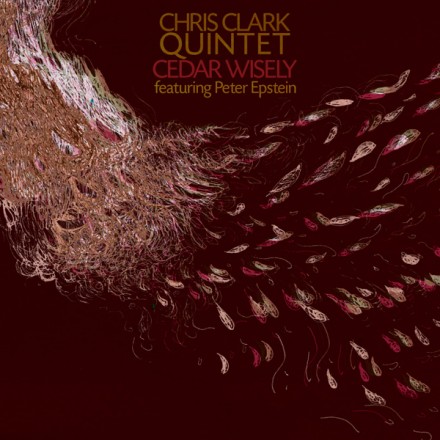Chris Clark Quintet
Cedar Wisely
SGL 1599-2“From the first note I ever heard him play, Chris has always struck me as a really creative and unique musician. There is a huge range of emotion in his playing and writing: from quiet stillness to raging intensity, and every point in between. And in all things, he is incredibly generous and thoughtful and that really comes across in his music. It’s always a huge pleasure when we get to play together.”
—Peter Epstein
This record is among other things the tale of two saxophonists who love playing and creating together. It is also the debut of a young musician who is just launching his own creative journey. When this sometimes-jaded label owner played the unsolicited CD that Chris Clark sent him, his mood changed as he listened through from beginning to end (a rare event in itself!). Here was an artist who knew how to judiciously pace the listener’s experience with, as Clark says, “a natural flow of energy or emotion” while continuously expanding the music’s range; to draw from the resources of modern jazz a personal, deeply felt statement; to create a fine expressive balance between composition and improvisation, combining structure and spontaneity. Clark’s compositions draw from contemporary edge, chamber elements, and a rich lyricism to form a spectrum of moods ranging from raucous to bittersweet. And, he has a band that’s there with him every step of the way.
This quintet was formed specifically for the recording session, although its members had played in various combinations in and around the jazz program at the University of Nevada, Reno, where Clark had come specifically to study with the Department Head, Peter Epstein. Clark, Teran, and Vega were students at the time and they performed frequently in the area as a trio, Fiscus. David Ake is also a professor at UNR and leads his own ensembles. “One of the things I love about playing with these musicians,” Clark comments, “is the level of freedom that exists when we play together. A perfect example can be found in ‘Indecisive.’ Prior to the recording session the overall vibe of the piano and sax solo sections stayed fairly similar. However, in the studio David began setting up a groove at the beginning of the sax solo by tapping on the wood of the piano. The rest of the group immediately switched gears, following his lead. That freedom to really listen and follow the music is one of the many aspects that make this group special, and I think one can hear that on the album.”
This commitment and passion for improvising does indeed come across, along with a sense of how to make a performance build and resonate without forcing the intensity. Epstein comments: “Finding a balance point between intent and result, without thinking about things too much so a real sense of flow can be established, leads to that elusive place that we all want to get to at all times so it’s particularly nice when it actually happens….Many of the folks that I’ve enjoyed playing with (Chris, Zack and Jesus certainly being among this number) seem to be coming from a perspective where there’s little or no separation between genres, styles, historical periods, or anything else that might provide inspiration or influence. Through-composed pieces exist side by side with free improvisations, standards and originals are approached with similar reverence and spontaneity – it’s ALL fair game.” Clark adds: “There are many different kinds of music which resonate with me, ranging from the more esoteric (Tin Hat Trio, Eric Whitacre, Sun Ra) to pop (Prince, Fiona Apple, Metric). The compositions on Cedar Wisely are strongly influenced by a number of artists. One can hear a very direct Ornette Coleman influence in ‘Inside the Gloves,’ which was deliberately written with his compositional style in mind. The other tunes have less obvious influences, but some artists whose music have made a strong impact on the formation of my own compositional voice include Cuong Vu, The Brian Blade Fellowship, and Wayne Shorter, specifically his albums from the 1960s and his current quartet. For me, the most important thing is that I feel connected to the music and can perform it with a sense of commitment and sincerity.”
While the quintet’s members have physically dispersed since the recording, Clark will be bringing them together for a tour in the fall of 2013, and Peter Epstein will be there for the upcoming CD release concert in New York. Epstein can also be heard on Songlines co-leading Lingua Franca with Brad Shepik, and in Shepik’s own groups, Jerry Granelli’s Badlands, and the James Carney Group.
